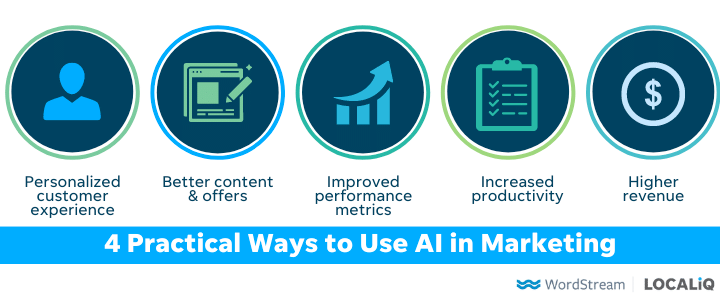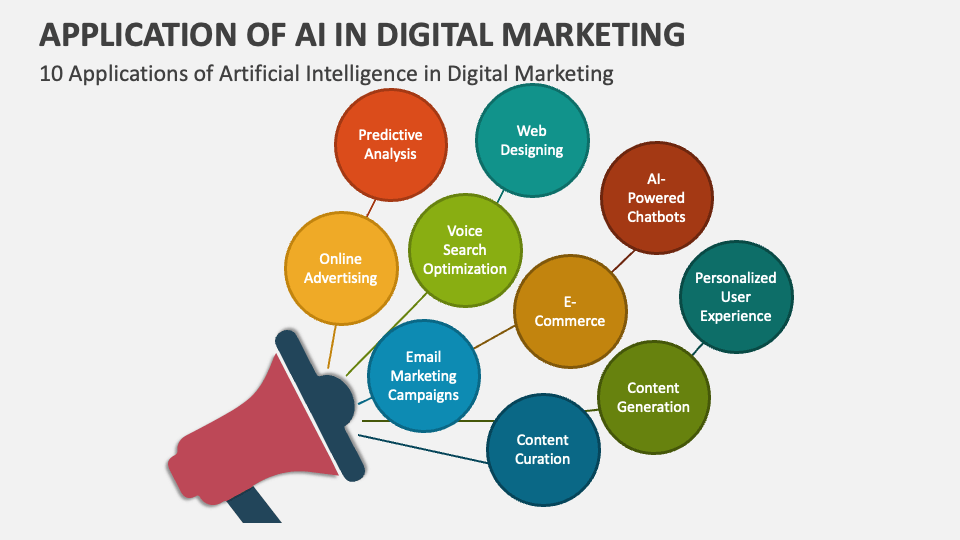Discover how AI applications in marketing transform personalization, customer insights, content creation, and campaign optimization for businesses.
Introduction
Marketing has evolved from simple print ads and billboards to highly data-driven and customer-focused strategies. In today’s digital age, artificial intelligence (AI) in marketing is revolutionizing how businesses connect with their audiences. From predictive analytics to hyper-personalized campaigns, AI enables brands to make smarter decisions, optimize performance, and improve customer experiences.
In this article, we’ll explore the most impactful AI applications in marketing, their benefits, real-world examples, and how businesses can leverage them to stay ahead of the competition.
The Role of AI in Modern Marketing
AI is not just a buzzword—it’s a practical tool driving efficiency and innovation. By analyzing massive datasets, AI algorithms identify patterns, predict consumer behavior, and automate processes that once required manual effort. According to Salesforce, 84% of marketers report using AI in some capacity, highlighting its critical role in shaping marketing strategies.

Benefits of AI in Marketing
- Improved Personalization – Deliver tailored messages based on customer behavior.
- Data-Driven Decision-Making – Use predictive analytics to anticipate trends.
- Enhanced Customer Engagement – Chatbots and virtual assistants provide real-time support.
- Efficiency and Cost Reduction – Automating repetitive tasks frees up resources.
Key AI Applications in Marketing
1. Personalized Customer Experiences
Personalization has become a necessity in digital marketing. AI tools such as recommendation engines (used by Amazon and Netflix) analyze browsing history, purchase behavior, and demographics to deliver highly targeted product suggestions.
Example: Email marketing platforms powered by AI can segment audiences and send personalized subject lines, offers, and product recommendations, increasing open rates and conversions.
2. AI-Powered Content Creation
AI writing assistants and image generators help marketers produce engaging content faster. While humans still guide strategy and creativity, AI tools can:
- Generate blog outlines or ad copy.
- Optimize content for SEO.
- Suggest trending topics based on audience preferences.
Pro Tip: Businesses can pair human creativity with AI’s speed to publish more content while maintaining quality.
3. Predictive Analytics for Better Insights
Predictive analytics is one of the most valuable AI applications in marketing. By analyzing past customer data, AI predicts future actions such as purchase likelihood or churn risk.
Real-World Example: E-commerce stores use predictive models to forecast demand and optimize inventory. This ensures products are available when customers want them, reducing lost sales opportunities.
4. Chatbots and Virtual Assistants
AI-powered chatbots like Drift or Intercom have transformed customer service. Available 24/7, they provide instant answers to FAQs, assist in purchases, and even qualify leads before passing them to sales teams.
Benefits:
- Reduced response time.
- Increased customer satisfaction.
- Lower support costs.
5. Social Media Marketing Optimization
Social platforms like Facebook, Instagram, and TikTok already use AI for ad targeting. AI helps brands:
- Identify trending hashtags and topics.
- Optimize ad placements.
- Analyze audience sentiment through natural language processing (NLP).
Example: AI-powered sentiment analysis can determine whether customers react positively or negatively to a campaign, guiding marketers to adjust strategies in real-time.
6. AI in Programmatic Advertising
Programmatic advertising automates the buying and selling of ads in real-time. AI determines which ads should be shown to which users, maximizing relevance and ROI.
Stat: According to Statista, programmatic advertising spending is projected to reach $725 billion globally by 2026, highlighting AI’s dominance in this area.
7. Email Marketing Automation
AI ensures email campaigns reach the right person at the right time. Marketers can leverage AI for:
- Predicting optimal send times.
- Creating dynamic subject lines.
- Analyzing customer responses for future improvements.
Result: Higher open and click-through rates, boosting overall campaign effectiveness.
8. Visual Recognition and Voice Search
AI also enhances marketing through computer vision and voice recognition.
- Visual Recognition: Retailers use AI to enable customers to search products by uploading images.
- Voice Search: With voice assistants like Alexa and Google Assistant, optimizing for voice search is now critical.
Tip: Marketers should focus on conversational keywords to capture voice search traffic.
Future Trends of AI in Marketing
As AI evolves, businesses can expect:
- Hyper-Personalization: Tailoring messages not just to segments but to individuals in real time.
- Emotion AI: Understanding customer emotions through facial recognition and tone analysis.
- AI-Driven Video Marketing: Automating video editing, captioning, and personalization at scale.
Marketers who embrace these advancements will have a significant competitive advantage.

Conclusion
AI is reshaping the marketing landscape, offering tools for personalization, automation, analytics, and customer engagement. From chatbots and predictive analytics to content creation and programmatic advertising, the applications are endless.
Businesses that adopt AI applications in marketing early can build stronger customer relationships, improve efficiency, and maximize ROI.
👉 If you’re ready to elevate your marketing strategy, start exploring AI-powered tools today and stay ahead of the curve.